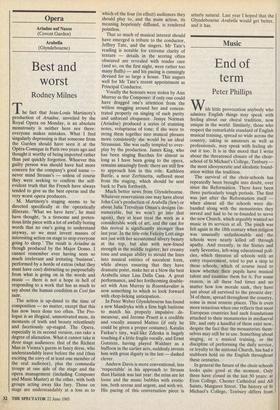Opera
Ariadne auf Naxos (Covent Garden) Arabella (Glyndebourne)
Best and
worst
Rodney Milnes
The fact that Jean-Louis Martinoty's production of Ariadne, unveiled by the
Royal Opera on Monday, is an absolute monstrosity is neither here nor there: everyone makes mistakes. What I find singularly depressing is that someone from the Garden should have seen it at the Opera-Comique in Paris two years ago and thought it worthy of being imported rather than just quickly forgotten. Whoever this guilty person was should have had more concern for the company's good name never mind Strauss's — unless of course they were seeking to confirm the self- evident truth that the French have always tended to give us the best operas and the very worst opera producers.
M. Martinoty's staging seems to be directed specifically at the operatically illiterate. 'What we have here', he must have thought, 'is a tiresome and preten- tious little piece with a lot of awfully boring words that no one's going to understand anyway, so we must invent masses of interesting action on stage to stop everyone going to sleep.' The result is Ariadne as though produced by the Major Domo. I cannot remember ever having seen so much irrelevant and irritating 'business', performed by a horde of extras (what they must have cost) distracting so purposefully from what is going on in the words and music — there is not a hope in hell of responding to a work that has as much to say about the human condition as Cosi fan tutte.
The action is up-dated to the time of composition — no matter, except that this has now been done too often. The Pro- logue is an illogical, unmotivated mess, its moments of truth and beauty relentlessly and facetiously up-staged. The Opera, especially in its second version, can take a degree of alienation. What it cannot take is three stage audiences: that of the Richest Man in Vienna's guests in fancy dress, who understandably leave before the end (thus exciting the envy of at least one member of the real audience), plus the commedia troupe at one side of the stage and the opera management (including Composer and Music Master) at the other, with both groups acting away like fury. Those on stage are understandably at a loss as to
which of the four (in effect) audiences they should play to, and the main action, its meaning hopelessly diffused, is rendered pointless.
That so much of musical interest should have emerged is tribute to the conductor, Jeffrey Tate, and the singers. Mr Tate's reading is notable for extreme clarity of texture — details in the scoring often obscured are revealed with tender care (and so, on the first night, were rather too many fluffs) — and his pacing is cunningly devised for so large a house. This augurs well for Mr Tate's recent appointment as Principal Conductor.
Vocally the honours were stolen by Ann Murray as the Composer: if only one could have dragged one's attention from the witless mugging around her and concen- trated properly on singing of such purity and unforced eloquence. Jessye Norman (Ariadne) produced a series of stunning notes, voluptuous of tone; if she were to string them together into musical phrases more consistently she would be an ideal Straussian. She was sadly tempted to over- play by the production. James King, who has been singing Bacchus for almost as long as I have been going to the opera, remains amazingly fresh: there are still few to approach him in this role. Kathleen Battle, a neat Zerbinetta, suffered most from the staging, which should be sent back to Paris forthwith.
Much better news from Glyndebourne. Whatever reservations one may have about John Cox's production of Arabella (few) or about Julia Trevelyan Oman's designs (in- numerable, but we won't go into that again), they at least treat the work as a considerable work of art, and the cast for this revival is significantly stronger than last year. In the title-role Felicity Lott sings not just with her accustomed silvery beauty at the top, but also with new-found strength in the middle register; her creamy tone and unique ability to mould the lines into musical entities of succulent form, while always ensuring that they have dramatic point, make her at a blow the best Arabella since Lisa Della Casa. A great performance, and her forthcoming double- act with Ann Murray in Rosenkavalier is now something to which to look forward with chop-licking anticipation.
In Peter Weber Glyndebourne has found a new Mandryka with a firm high baritone to match his properly impulsive de- meanour, and Jerome Pruett is a credible and vocally assured Matteo (if only he could be given a proper costume). Katalin Farkas's tiny, waif-like Zdenka is hugely touching if a little fragile vocally, and Ernst Gutstein, having played Waldner as a buffoon in the earlier acts, suddenly invests him with great dignity in the last — dashed clever.
Andrew Davis is more conventional, less `respectable' in his approach to Strauss than Haitink was last year: the reins are let loose and the music bubbles with erotic- ism, both serene and urgent, and with wit. His pacing of this conversation piece is
utterly natural. Last year I hoped that the Glyndebourne Arabella would get better, and it has.














































 Previous page
Previous page